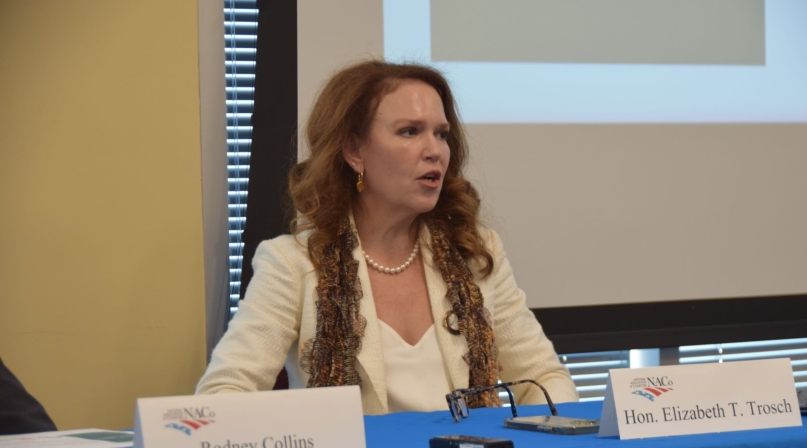Many players complicate justice system changes

Criminal justice operates as an ecosystem, just like a forest, a coral reef or a grassland. Law enforcement, court judges, court coordinators, the court clerk, public defenders, prosecutors, juvenile justice, child welfare, school districts and even financial services like bonding agencies all interact.
That makes change hard, even when participants are willing and motivated, given the number of participants.
“The criminal justice system consists of constitutionally distinct entities with distinct constitutional responsibilities, with separately elected leaders at the helm, so there’s not one system to say, ‘Let’s talk about how we are policing and who gets fed into the system,’” said Elizabeth Trosch, chief district court judge for North Carolina’s 26th Judicial District.
“Judges are independently elected judicial officers in North Carolina, they act independently, and so getting judges to do one thing together doesn’t happen. You’re not working with this one coordinated system, you’re managing various independent leaders to see a shared problem and find some shared solution.”
That shared solution is a way to eliminate racial and ethnic disparities in the criminal legal system, the mission of NACo’s CORE Justice Network — County Officials Advancing Racial Equity.
Recent studies show Black adults are currently 4.3 times more likely to be detained in Mecklenburg County than white adults.
Network members met in November in Mecklenburg County, N.C. for a peer exchange, where Trosch said the county’s creation and funding of a Criminal Justice Services division has been critical in coordinating those disparate actors.
The county’s Criminal Justice Services division includes the work done by the Criminal Justice Advisory Group, the Racial and Ethnic Disparities Workgroup and the Community Engagement Taskgroup.
County investment
“I don’t think we would have gotten even to the point of being able to share and look at all our data together,” she said, without the county’s investment, which largely supports data analysis and research and gives credibility to the county’s efforts to reorient the players in its criminal justice system.
Even with that step, achieving a more equitable justice system has necessitated a piecemeal approach. For its part, the county’s sheriff’s office requires every supervisor to complete racial equity workshops led by local nonprofit Race Matters for Juvenile Justice.
“It really served as an eye-opener for a lot of our personnel,” said Rodney Collins, chief deputy sheriff in the Mecklenburg County Sheriff’s Office.
“We don’t control who we get in the detention environment, the disparity has already occurred before they hit the door, so there are several decision points that come along that process … at the point of arrest, what happens when they see the magistrate, what results in the booking versus someone having to appear in court,” Collins said. “All those decision points are what this data showed and really brought out and highlighted some of the disparities that we currently experience in Mecklenburg.”
Different perspectives
Each of those players in the criminal justice ecosystem approach their work from different perspectives, which can complicate matters.
“When you talk about diversity, equity and inclusion, there’s no uniform definition and each institution has the power and privilege to determine the language and term based on the culture of that organization,” said Derrick Anderson, executive director of Race Matters for Juvenile Justice. “That’s why this subject matter is so hard, because based on your background, your experiences, your exposures, we all come in with a different perspective. And what we want to do is level-set to ensure that the language that we’re using is the same language.”
There was trepidation about how public to make the department’s analysis of demographic data about the county’s justice system, which was provided to the Racial and Ethnic Disparities Workgroup, but Trosch said transparency offered its advantages in showing how various entities were working to eliminate those racial disparities.
“I don’t know that there’s any particular strategy that was persuasive and getting us over the line to just say ‘Look, this isn’t a secret we kind of know what our systems are doing,’” she said. “The raw data is available, anybody can handle it and perhaps we are better off building greater trust in our community if we just acknowledge it.”
Sonya Harper, the county’s director of Criminal Justice Services and leader of the Criminal Justice Advisory Group, said the data analysis, driven by jail overcrowding, showed an opportunity to reform the bonding system.
Analytic insight
“We had a lot of folks in custody that were being held in our jail for offenses that we really didn’t consider to be public safety offenses,” she said. “We were seeing secured bonds being issued at rates so high for offenses that were not considered really any kind of threat to our community,” including possession of drug paraphernalia and expired licenses.
“We found if you are detained during the pretrial phase, you’re more likely to be convicted, you’re four times more likely to be sentenced to jail and three times more likely to be sentenced to prison if you are held in custody during the pretrial phase,” she said.
That kind of analysis can help show different players in the system where their policy changes can make the most difference.
Funding from the John D. and Catherine T. MacArthur Foundation through its Safety and Justice Challenge, starting in 2017, helped Mecklenburg County design unconscious bias training tailored for different players in the criminal justice system, with specific tracks for law enforcement, magistrates, judges, prosecutors and public defenders. The county has made that training publicly available.
“There is no sector of our government which has to grapple with the day-to-day existence of equity than cops,” said Spencer Merriweather, district attorney for North Carolina’s 26th District. “They’re seeing it every single day, and a lot of times people are struggling to figure out how to talk about things.
“They are on the street dealing with realities that a lot of folks in other professions were just kind of talking about theoretically. They’re seeing stuff on the ground and not necessarily knowing how to talk about it and make sense of it, so having an opportunity to do it through the kind of dialogue opportunities that we have here, I think is a value-add for our law enforcement officers.”
And better coordination across the criminal justice field will help them align for better outcomes. “I can’t change who gets arrested, I can’t tell Charlotte-Mecklenburg Police Department, ‘Don’t arrest for this offense’ or ‘Don’t arrest in this neighborhood’… I don’t have any authority,” Trosch said.
“I can’t fix who the police officers bring to me, but I can try to fix what my magistrates and my colleagues are doing when they have encountered someone and have to make that critical decision about whether to release or detain.”
Featured Initiative
CORE Justice Network
The CORE Justice Network was a group of county officials working to drive change in the criminal legal system. The cohort focused on innovative, county-led approaches to equity, exploring policies, practices and programs with measurable impact on justice-involved populations.

Related News

House passes legislation to increase the Crime Victims Fund
On January 12, the House passed the Crime Victims Fund Stabilization Act (H.R. 909) by a voice vote.

CMS requires state Medicaid suspension upon arrest versus termination
Effective January 1, 2026, federal law now requires states to suspend, rather than terminate, Medicaid coverage when an individual is incarcerated.

